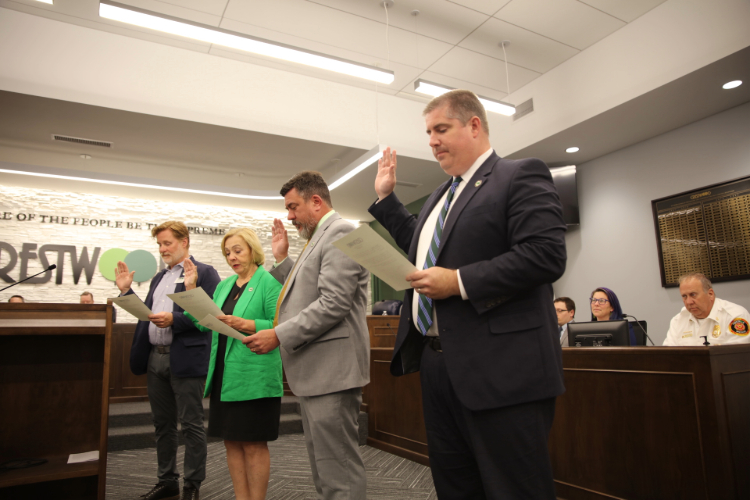An ordinance finalizing financing arrangements for a new aquatic center, stormwater improvements and a new community center was approved last week by the Sunset Hills Board of Aldermen.
The approved ordinance authorizes a lease/purchase agreement between the city and UMB Bank in which the bank will lease Watson Trails Park to the city in return for an annual payment that will be used to retire bond-like certificates being issued to fund the projects.
Aldermen last month approved a resolution authorizing the issuance of certificates of participation, or COPs, not to exceed $14.5 million in principal.
The ordinance approved by aldermen Aug. 11 authorizes the city to enter into a certificate purchase agreement involving UMB Bank and Stifel, Nicolaus & Co. Inc.
An Aug. 24 closing is planned for the sale of $14,110,000 in COPs.
The board’s decision on the amount of COPs to be issued was not a unanimous one. Mayor Mike Svoboda cast the deciding vote July 15 after aldermen deadlocked 4-4 on a resolution authorizing the amount of COPs not to exceed $14.5 million to fund the new aquatic center, stormwater improvements and new community center, which currently carry an estimated price tag of $11.4 million.
Voting in favor of the resolution were Scott Haggerty of Ward 2, Tom Hrastich of Ward 2, Jan Hoffmann of Ward 3 and Pat Fribis of Ward 4. Opposed were Bill Nolan of Ward 1, Frank Hardy of Ward 1, Stephen Webb of Ward 3 and Frank Gregory of Ward 4.
Those opposed to the resolution wanted to pursue alternative methods of financing the projects, including issuing a lesser amount of COPs. The COPs will be retired with revenue generated by Prop P, a 20-year, half-cent sales tax to fund parks and stormwater improvements approved by voters in April 2007.
At the Aug. 11 meeting, Hardy noted he had asked for additional information about the financing arrangement, but did not have enough time to review the roughly 60 pages of material he received the previous day.
“… I just feel that I don’t know enough to make an informed decision either for or against this, and I don’t know enough to ask the questions, so I request some more time before we bring this to a vote. I think that we were talking about millions of dollars that we’re committing the city to indebtedness that we should take our time and make sure that it’s understood what you’re voting on,” he said. “And I personally don’t feel that I know enough to vote on this bill at this time. So I would like to move that it be tabled until the September meeting.”
Hardy’s motion failed for lack of a second.
Gregory later asked Bob Ballsrud of Gilmore & Bell, the city’s bond counsel, and Jim Lahay of underwriter Stifel, Nicolaus to address Hardy’s concerns.
Ballsrud said, “… The structure of these financings really is fairly simple when you look at it from a big-picture standpoint. There will be a long-term lease of the park property from the city to UMB Bank as trustee acting on behalf of the bondholders. And UMB Bank then turns right around and leases the property back to the city on a year-to-year basis.
“And the reason that is done is that under Missouri law, the city cannot enter into a long-term obligation — more than one year — without the voter approval. So for state-law purposes, this lease creates just a one-year lease obligation of the city that then, subject to your approval every year when you consider the budget and there will be a line item in the budget for an appropriation of the debt service that is due in the next fiscal year, and with the approval of the budget and the line item, then you are renewing that lease for another year. But this has to come back to the Board of Aldermen every year …”
When the COPs are retired, the lease ends, Ballsrud said.
Gregory later said to Ballsrud, “Bob, to summarize it, a lot of this information is boilerplate information, which you have not created specifically for this transaction. It is in every transaction that has involved COP bond issues, et cetera, et cetera.”
“There are hundreds of these types of lease financings done in Missouri every year and they’ve been done in neighboring communities. Most recently, the Kirkwood Public Library did lease financing that was identically structured to this …,” Ballsrud said, citing several other examples in the area, including some “very visible projects … The Edward Jones Dome downtown was financed through a lease arrangement with St. Louis city, St. Louis County and the state of Missouri. So they’re all the way from the hundreds of millions down to much, much smaller financings and they’re all basically structured the same way. There isn’t anything that is really unique about the structure that was used for this financing.”
Hardy later said, “I just want to say just to clarify it, I want to see all three of these project areas go forward, too, just like everybody else up here. But I also understand that we’re obligating not only ourselves but future boards after ourselves to a good-sized debt and I want to understand it before I make that obligation. So it’s I don’t know enough to vote for or against it. I don’t know enough to ask questions and I appreciate your explanation, but I’m just uncomfortable right now …”
Svoboda noted the total cost of the COPs with interest would be roughly $21 million and they would be retired over a 19-year period. During that same period, the mayor noted the city will spend $120 million to $130 million for normal operations.
“Over a 19-year period …, we’re going to be spending $120 million, $130 million in our regular budget process,” he said. “So the previous boards indebted us with these buildings that they got.”
Hardy said, “I understand that, but I also looked at the collector’s report this month and through July, we’re $70,000-plus in the hole as far as the COP tax. So we’re losing $10,000 a month of what our budgeted amount is.”
Svoboda said, “If you can predict what’s going to happen over the next 19 years …”
Hardy said, “None of us have a crystal ball.”
Before the vote was taken, Gregory said, “… At the meeting on July 15th, we spent a considerable amount of time hashing out, teeth gnashing and hand wringing and discussion and conversation about this whole process and ultimately how many dollars would we be seeking. At the July 15th meeting by a majority vote it was decided that the city was going to move forward with a certificate of participation program up to a maximum of $14.5 million. Again, was it the entire board? No, but it was a majority, and the way we are operating, majority rules.
“That being said, at that same meeting we also set forth a time frame of having bond counsel — not bond counsel, but Stifel Nicolaus — giving them the authorization to move forward to start marketing the bonds. At that point in time, the wheels were set in motion for us to go to the markets, try to secure financing and basically put Sunset Hills, the city of Sunset Hills, on the line to perform as decided at that July 15th meeting. For us not to support this at this point in time would jeopardize not only our reputation, but our ability in the future to go and secure financing. There’s a credibility issue with respect to a lot of different issues. So again, based on that action that we took on July 15, I think it’s very clear that it’s — regardless of our personal differences as to what should or shouldn’t have been done, the decision was made and now I think we as a board need to support it,” he said.
Board members voted 5-1 to approve the ordinance with Nolan opposed and Hardy abstaining. Webb was absent.
After Hardy said he was abstaining “based on my previous comments,” City Attorney Robert C. Jones declared, “That’s a nay vote.”
When the votes were being tallied, Jones elaborated, “The abstention’s actually a nay. You can’t abstain unless you’re disqualified because it’s a no vote because you have to have five affirmative votes. It’s a 5-2 vote.”
Jones later told the Call he doesn’t believe an elected official has the right not to vote.
“… First of all, you have to have an affirmative vote to pass anything, right? So if you don’t vote affirmative, you’re in effect voting against it,” he said. “But besides, I don’t think you have a right as an elected official to come to a meeting unless you’re disqualified by law and not vote on the issue.”




















